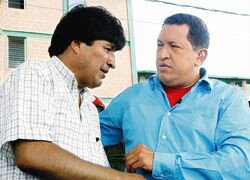O fim da Bolívia?
 Leitura recomendada: The End of Bolivia?, por Michael Radu.
Leitura recomendada: The End of Bolivia?, por Michael Radu.Judging by its voters' behavior Bolivia, which has a population of 9 million, seems interested in remaining South America's poorest country. The country is both a major producer of coca and a loser in all its wars (most of which it started) against its five neighbors. In many ways it is a black hole in the heart of South America, which is precisely what makes it strategically important and explains Ernesto "Che" Guevara's having chosen it to jumpstart a communist revolution throughout the continent. Other than coca, Bolivia’s only major resource is the natural gas in the lowland departments of Santa Cruz, Beni and Tarija.###
But this is not just a case of a country that was polarized between two opposed ideological approaches and two very different leaders simply letting the people decide. Just like his mentor Chavez, the author of two failed coups against elected governments in Venezuela, Morales' idea of democracy is "If I win, fine; if not, 'the people' will bring me to power anyway" – as was demonstrated by his direct involvement in the overthrow of two constitutional presidents in the last three years by mob action. Morales election will make what remains of Bolivian democracy a charade. It will also revive a disturbing memory of Chile in 1970, when Salvador Allende was elected with a third of the vote but interpreted that as a mandate for revolution – which is precisely what Morales does.
(...)
And then there is Washington. Morales' destruction of democracy in Bolivia has been tolerated by the Bush administration for years. Hence the absence of any serious reaction when mobs led by Morales overthrew constitutional presidents Gonzales de Lozada and Carlos Meza, even though Morales' promised legalization of coca will made a joke of America's decades-old efforts to control and limit coca production in South America. Morales claims a historic right to cultivate coca because the Incas did it – except that even the Incas controlled production. In Bolivia, it was never cultivated in the Chapare – that was a 1980s development, far from "traditional," led by the likes of Morales and openly intended to make big money from cocaine, not from Indians chewing the leaves. Interestingly, when a military junta under Garcia Meza in 1980 got rich from drug trafficking, it was labeled "fascist," but now that Morales is openly proclaiming his intention to do basically the same thing, he calls it "progressive" and "traditional."
por André Azevedo Alves @ 12/30/2005 03:42:00 p.m.
![]()

<< Blogue